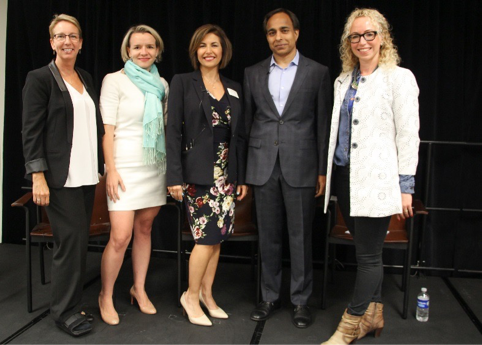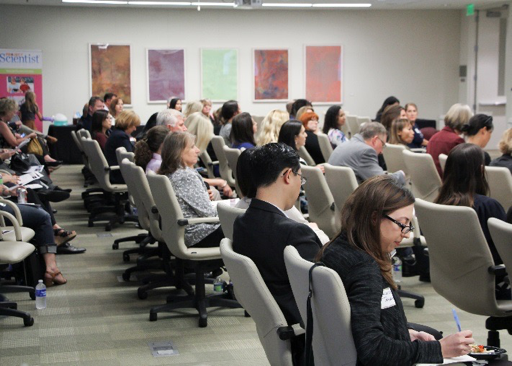The evening kicked off with a word of thanks to our sponsors, Resources Global Professionals and Splunk. Sandy Marshall, Founder and CEO of Project Scientist (projectscientist.org) also provided an overview of their wonderful non-profit organization that helps connect and engage young girls into the field of Science.
Vicki Shillington, Chief Happiness Officer of Beachbody, did a phenomenal job of moderating the panel including Sanjay Kucheria, Chief Executive Officer of Trinus; Carla Fitzgerald, Chief Marketing Office at Smith Micro; Carol Fawcett, Chief Information Officer at Dell Software; and Heather Lord, Global Head of Innovation and Strategy at American Funds.

Pictured from left to right: Carol Fawcett, Heather Lord, Carla Fitzgerald, Sanjay Kucheria, Vicki Shillington
Key topics evolved around strategy, digital transformation, and millennials.
Digital transformation is moving IT strategy front and center. With relationships between IT and stakeholders becoming stronger, how much overlap is there between corporate strategy and IT strategy now and 5 years from now?
Sanjay Kucheria, CEO Trinus, commented that business strategy ultimately forms the IT strategy. Clarity around understanding the business strategy depends on the level you are in the organization. He doesn't expect everyone in the org to have a clear understanding of the business strategy; however, he stated that business and IT are becoming inseparable.
Heather Lord, Global Head of Innovation and Strategy at American Funds, commented that it's not an either / or question. You can't talk about business strategy without talking about IT. There are no boundaries between strategy, innovation, and execution - they are inseparable. It's good to have a healthy tension between business and IT.
Heather asserted that in the investment management industry, we are on the brink of material disruption. "With digital disruption, the way people consume our services will be vastly different. Business, technology, sales, and marketing all need to be highly conversant; our role needs to change as this industry changes."
You just become a master tinkerer if you don't connect these strategies, says Carol Fawcett, CIO Dell Software.
For Carla, Smith Micro's CMO, the IT strategy is critical in moving product lines into new markets. "We can't do marketing today without IT. It's vital to understanding the results of marketing campaigns with email automation, Influence platforms, and/or CRM to either promote or tear down products. At Smith Micro, we have sales cycles anywhere from 5 seconds to 18 months. The way the technology is implemented to support these varying cycles is immensely different. IT needs different skills to support these different sales cycles."
What do IT organizations need to do differently to aid in supporting the business strategy?
- Be more proactive in suggesting what technology can do to help and portray the impact on both the business and IT including maintenance, business and IT roles, etc.
- Sit in the seats of their customers; walk in the end user shoes to help make it better.
- Ensure predictability with communication. Remove techno jargon and think about how your mom would read your email. Is she going to "get it"? Less is more, focus on only the salient points. In addition, think about the state of mind everyone is in as you start the dialogue.
- Organizational skills and project planning is key to driving results.
- Always ask yourself, "Are you truly solving a business problem?"
Where there's limitations, there's also abundance, states Mr. Kucheria. "If you "believe", you can find fantastic opportunities". For example, Uber disrupted taxi gatherings which created significant opportunities for others not originally involved in the taxi industry. There will always be dislocation that we can't get away from. It's through this disruption, however where you need to consider how you can make yourself invaluable. Take a look at your portfolio of skills and capitalize on them. It's not easy to outsource, thus what are the qualities that you care about and how accountable are you as a person? What's the predictability of the value you provide to the firm? This is becoming more and more important to firms today. It may seem like common sense, but it's not common sense. Be predictable in your delivery.
Additionally, active listening is most critical for Heather and her team. American Funds is leveraging "Design Thinking" from the end user perspective. It's all about listening in order to germinate that idea.
How far will we get with digital disruption? Any Predictions?
Back to the Uber example, comments Mr. Kucheria, now that Uber is working on their new self-driving cars, consider what will this do to the Uber drivers. This will disrupt the very people that they brought into their ecosystem. There will be a ripple effect of self-driving cars across industries. What might this mean to home construction as to how many garages should be built for homes? There are even automated burger assemblers that will be changing the fast food industry.
Ms. Fitzgerald states that big data and BI (business Intelligence), machine learning, and AI are further accelerating business with insights that come out of data. Being predictive is the key. She mentioned that the Chief Marketing Officer from Domino's Pizza was recently on stage at a conference and pronounced that Domino's Pizza is a digital company that sells pizza. Master Card doesn't consider themselves a financial services firm, they are a data company. Google is the largest intelligence company that masks itself as a search company.
Ms. Lord mentioned challenges in investment management business that are being set outside of our industry. She can't pick the time horizon, but there will be a disruptive change in the model of how one obtains investment advice. "Wealth management has the 3 ingredients of an industry ripe for disruption: dissatisfied or underserved clients, a large profit pool and possibility of powerful technology innovation. Today, many investors, and Millennials in particular, are unsatisfied with the current model. There is a $100B profit pool at stake. And, the role of technology is transformative - whether it is AI and Machine Learning in the investment process to digital experiences for investors is staggering. As a firm, our challenge is to stay true to our core and preserve that center that has let us earn a leadership position in the market, and at the same time, evolve and innovate to remain relevant".
.
Geoff Webb, from Net IX, views the single biggest challenge for a CIO is relevance. The business has moved so far towards the model of instant IT gratification, supplied by cloud service delivery models, that IT organizations are becoming secondary in the thinking of business users". "Unless IT can demonstrate that they can move quickly enough and add sufficient value, the IT organization runs the risk of being marginalized to the point where they are relegated to managing the 'plumbing' of the infrastructure.
Are their roles in your organizations that just "manage the plumbing?" How are your organizations staying relevant?
At Dell Software, Carol commented that they don't do much support as they have stable systems. No one really has a "support" role. We create the tools that do this for us, and it's all being automated. The role of a former "support" person has evolved so they can do the next best thing. There's also such thing as an IT project; we do work for the business. We are at the table with them.
With all this talk about digital transformation, let's focus on the skills and mindsets needed for this new world. There is a lot of talk about the needs of millennial's. I like to think of old dogs and new dogs and what are the old tricks that can be applied to these new dogs. We know that old dogs expected facilitated training in moderation whereas new dogs expect training to be on demand and technology-based. Old dogs expected feedback twice a year during the performance management cycle where as new dogs need consistent and frequent feedback.
What can we learn from Millennial's and Millennial's learn from the "old dogs"?
Communication is the key; draw millennial's into the conversation, says Mr. Kucheria. Ask what they think but ensure they draw on their own thought process and their own experiences. Be in the moment. Perspectives are very helpful; surround yourself with people with a different perspective and always ask "what are we missing", comments Ms. Lord.
Carla's suggestion to millenials is to "toughen up"! As millennial's grew up with so many conveniences, it's important for the younger generation to know that it's now always convenient. Find something to contribute, be resourceful.
As executives with titles of CEO, CMO, CDO, CIO, CTO, CHO, the skills set needed to do the job seems to be blending. You are all strong in communications, finance, technology......Are you interchangeable?
The panelists emphatically stated "No!" Partnerships are where the power is, Ms. Fawcett emphasized. It's tantamount to challenge your peers thinking and be ready to be challenged by them. While they are not interchangeable, they agreed they all share the same characteristics including forward thinking, challenging status quo, and the desire to hire the best teams.

Additional event pictures are located
here.
A heartfelt THANKS to our event sponsors:


Opinions expressed by the author are not necessarily those of WITI.
Are you interested in boosting your career, personal development, networking, and giving back? If so, WITI is the place for you! Become a WITI Member and receive exclusive access to attend our WITI members-only events, webinars, online coaching circles, find mentorship opportunities (become a mentor; find a mentor), and more!
Founded in 1989, WITI (Women in Technology International) is committed to empowering innovators, inspiring future generations and building inclusive cultures, worldwide. WITI is redefining the way women and men collaborate to drive innovation and business growth and is helping corporate partners create and foster gender inclusive cultures. A leading authority of women in technology and business, WITI has been advocating and recognizing women's contributions in the industry for more than 30 years.
The organization delivers leading edge programs and platforms for individuals and companies -- designed to empower professionals, boost competitiveness and cultivate partnerships, globally. WITI’s ecosystem includes more than a million professionals, 60 networks and 300 partners, worldwide.
WITI's Mission
Empower Innovators.
Inspire Future Generations.
Build Inclusive Cultures.
As Part of That Mission WITI Is Committed to
Building Your Network.
Building Your Brand.
Advancing Your Career.





Comments